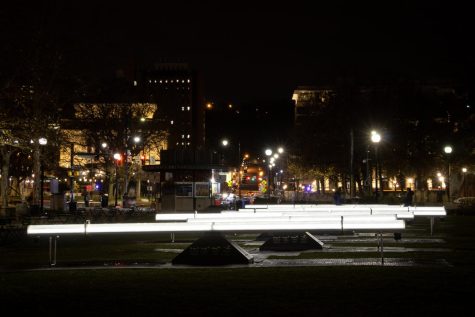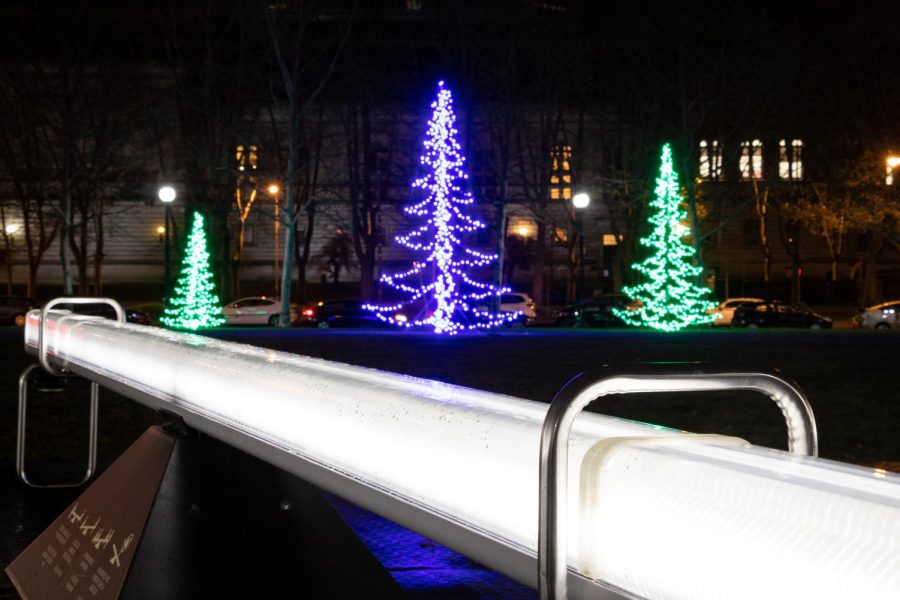‘Glowland’ fills Schenley Plaza with giant seesaws, produces motion-based art
Ethan Shulman | Staff Photographer
Holiday lights in Schenley Plaza.
December 1, 2022
Holiday lights, seesaws and small business vendors 一 oh my.
Oakland Business Improvement District is gearing up for the winter season with a new art-based community project, Glowland. Glowland is a month-long winter festival that features a series of light-based art installations, yard games and live music until Dec. 18. While events take place in Schenley Plaza, OBID will install light-based art throughout the Oakland neighborhood during the festival period.
Leah Friedman, OBID’s marketing and communications manager, said their mission for Glowland is to bring more people into Oakland, and for them to see everything the neighborhood has to offer.
“The ultimate goal is bringing people in to experience Oakland 一 to sort of explore, learn a little bit more about the innovation that’s happening here,” Friedman said. “Also activate some of these spaces that go a little bit dead and a little bit dark in winter, especially when students leave.”
Glowland hosted Small Business Saturday last week, where Argyle Studios, the Hilton Garden Inn at University Place and Kate’s Kid Book Bash had pop-up stands outside of the Schenley Plaza tent. Upcoming events include Pittsburgh Tuba Christmas and a DJ on Dec. 3, music by Arie Cole on Dec. 10 and a winter play day on Dec. 17.
Impulse, an interactive art installation created by Lateral Office and CS Design, features 30 giant seesaws throughout Schenley Plaza for Glowland. Motion-activated to glow with white light, Friedman said the seesaws bring out the kid in everyone.
“It’s so funny seeing people get on, interact with the Impulse installation. Just the most serious people you could ever imagine getting on this thing … They just completely become children and just laugh and smile,” Friedman said. “I was expecting it to pull a lot of people in and be different, but I don’t think I was expecting how much joy it’s creating with people.”

The Glowland project will also bring light-based art installations to Oakland’s business districts. Friedman said many local business owners were eager to let Glowland’s artists light up their storefronts.
“I’m really enjoying … seeing what the different artists that we’re working with are coming up with and the small spaces that they’re able to find and illuminate,” Friedman said.
Ian Brill, a Pittsburgh-based sound and performative installation artist, is working on a large art installation for the Pittsburgh Athletic Association Building. Although the entire project has not yet come to fruition, he said he wants to transform the building to resemble somewhat of a giant fireplace.
Brill compared his work with performative installations to making music, as he has past experience as a musician. He said he’s fascinated with exploring humans’ relationship to technology through his programmatic art.
“I naturally arrived at what I’m doing as thinking about the way that you can essentially create music with visuals and visuals with music,” Brill said. “These sort of ideas of thinking about … the way that our sensors work. Our ears and their eyes 一 they’re really just like their hardware and our brain just unpacks. There’s things that can be achieved with gesture, with motion, with color.”
Creating such an installation is meticulous, according to Brill. The installation relates to musical performance because, like a musician, he carefully times the lights’ movements in order to earn a certain reaction from viewers.
“The aesthetics of the piece are very much time-based, generative events,” Brill said. “It’s like when a lead performer does something on the fly that has this nice emergent effect. There are algorithms and computational behaviors that are going to be in motion 一 also create these moments that are really wonderful.”
In addition to large installations like Brill’s, six local artists including Cornelius Henke III and Terry Valencheck collaborated to illuminate landmarks like Dippy the Dinosaur in front of the Carnegie Museums and the Schenley Plaza tent.
Henke said he and his collaborators are very intentional about how the lights in the tent move. Because the project is in a tent, the artists don’t have to worry about the lights distracting cars on the road. Henke said they have the freedom to play around with the speed of the lights in the tent, unlike traditional holiday lights on buildings.
“[The lights] are what we would call ‘chases,’ where the lights would move around,” Henke said. “You can almost imagine if you walked in wearing headphones and listening to some cool music, that you would look up and feel like you’re in a light show that matches your mood.”
Henke added that Glowland’s installations would have an entirely different look if there was snow on the ground.
“The thing that’s sad is if there was snow on the ground, all of the lights would reflect more. The light would be like a mirror to what’s going on up above. So you miss out on that element a little bit. Also the seesaws glowing on top of whatever snowy surface,” Henke said. “I like the nature of change. I hope we get a decent winter.”
OBID plans to continue hosting Glowland every winter, Friedman said. The festival’s planning process began more than two years ago, before the COVID-19 pandemic. Now that lockdowns are over, OBID aims to revive the connection between Oakland’s residents and its businesses. The best way to do that, she said, is to get people outside more often.
“[Businesses] are still in recovery, but we’re finding ways to bring places to life and activate those spaces, especially those kind of forgotten spaces,” Friedman said. “Especially because there’s so many people who come through Oakland every day and they’re sort of like, cooped up in a hospital or working as a student within the buildings.”
This year’s art installations and events are just the beginning for the festival. In the future, Henke said Glowland will hopefully expand to support more local artists and businesses.
“Last year, Glowland was the living lights in front of UPMC Magee,” Henke said. “Now OBID has a really keen vision to incorporate more art from local artists, and to hire more people locally and to try and fund really cool projects going forward. I’m really looking forward to seeing what Glowland looks like next year and the year after and so on and so forth.”



